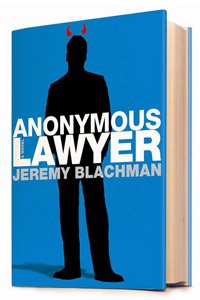My last two posts have been about student behavior in class, and in particular about the potential pitfalls of cell phones and computers in class. The posts can be found here and here. There were some very good comments to both posts, so be sure to check them out as well.
Ultimately, both posts were concerned with disruptions or distractions in class, as well as the importance of facilitating classroom discussion and student interest. Of course, no use of snazzy technology or bans on phones or computers will make a bad class good. But this got me to thinking: what do the readers of this blog think were the really good and really bad things about their law school classes? I'd really like to hear your thoughts.
So what was it? Were the classes too big? Did the Socratic method (or whatever approach the profs used) stink? What could have been done better? Did law school prepare you at all for your career in law? What did did you find particularly beneficial? Was there something you really enjoyed about law school? Etc. etc.
Basically, this is an open invitation to rant (or rave, if you have positive things to say). As someone who cares about the educational experience of law school, I'd really like to hear what you have to say.
Law has always been one of the sought-after and widely respected degrees to study at university. Our guide has everything you need to know to get started.
Tuesday, 26 September 2006
Tuesday, 19 September 2006
Computers in Class
 I have been intrigued by some articles I've read recently about law profs who have decided to ban computers in their classrooms. In my class there would be an irony in such a ban, since I sometimes use A/V equipment (PowerPoint slides, videos, websites, and the like). But I have to say that, as unpopular as the move might be with students, it has intuitive merit. Discussion of this subject has appeared on the WSJ Blog, Boston.com, TaxProf Blog, and Conglomerate.
I have been intrigued by some articles I've read recently about law profs who have decided to ban computers in their classrooms. In my class there would be an irony in such a ban, since I sometimes use A/V equipment (PowerPoint slides, videos, websites, and the like). But I have to say that, as unpopular as the move might be with students, it has intuitive merit. Discussion of this subject has appeared on the WSJ Blog, Boston.com, TaxProf Blog, and Conglomerate.So should computers be banned from law school classes? (Exceptions would have to be made, of course, for students with special needs.) Here are some considerations for and against such a general ban.
Some Reasons to Ban Computers in Law School Classes
Some law profs believe computers get in the way of class discussion. Harvard Law School's Professor Elizabeth Warren takes this view. (See an article discussing her position here.) She teaches commercial law courses such as Secured Transactions, which I have also taught, and in my experience commercial courses can be dry. So maybe in such classes, law profs need all the help they can get, in order to make the class (and class discussion) more interesting. But Harvard Law School's Professor Bruce Hay teaches subjects with a far higher cool factor (Law & Drama, anyone?), so maybe it's not just a dryness issue.
Two anecdotal points from my own experience are worth mentioning. Recently, I had a student tell me that she would take notes furiously in class, and then go home and try to figure out what the professor had been saying. Hmm. Maybe it works, but I think the better approach might be to listen to what happens in class, and then go home and expand your notes or work on your class outline. Just because you took down every word does not mean you understood what was said, or will be able to understand it better later. One student does not a trend make, but her observations ring true. Plus, when I tell my classes to stop taking notes and just listen, I usually see improved class discussion.
Second, during my days in practice I learned not to take too many notes during a client meeting, either on computer or on paper. Scribbling or typing furiously did not help nearly as much as really listening and taking sparser notes. Lawyers often complain that law schools do not prepare students for the practice of law. OK, then, perhaps classes should be structured so that they not only teach substantive knowledge, but also practical skills. If computers get in the way of developing effective listening and note-taking skills, perhaps they should be kept out of the classroom. Taking notes is a lawyerly skill. Being a stenographer is not.
Some Reasons to Allow Computers in Law School Classes (and Some Counter-Arguments)
What are some reasons not to ban computer use in law school classes? First, are we being old-fashioned fuddyduds if we require digital age students to take handwritten notes? Haven't many of them gone to colleges (and even high schools) that have actually required computer use in class? I find that a compelling argument.
Second, shouldn't we treat students like adults and let them make their own choices? If they want to type versus write--or even play Spider Solitaire versus pay attention--isn't that their choice? How dare we be paternalistic! In fact, isn't the ability to play FreeCell and conduct a teleconference call practically a necessary skill for the modern lawyer? If you can't do it in class, will you be able to hack it in the real world?
I think the answer to these questions is "Yes, but . . . ." The "but" part is this: with respect to paternalism, others have observed (see links above) that law schools often make class attendance mandatory (i.e., not a matter of free choice), and we have no problem with that sort of paternalism. Yet maybe it's that law school itself is voluntary, and if you sign up for it, you have agreed to attend your classes--but you haven't agreed to take notes in a certain way (that is, by hand). What I am saying is that a computer ban is paternalistic to a degree, and how paternalistic depends on how you characterize it.
With respect to multitasking on a conference call, I am not sure that is a skill law schools need to be teaching. Even though it happens in practice. A lot. There are other, more socially valuable skills than computer games that lawyers need but we don't teach them--like how to eat spaghetti without getting it on your shirt. (Try and make partner looking like a slob. You may do it, but it's harder.) So maybe we let them learn Minesweeper skills on their own.
Ultimate Indecision
In the end, I am up in the air on whether computers should be banned by profs in law school classes. I find the idea interesting, but I wonder whether it is more trouble than it's worth. Perhaps one day I will try it as an experiment, and see how it goes. But for now, I'll just let things ride.
In fact, maybe letting it ride is indeed the right answer. The modern world has so many distractions, so many tech gadgets, that perhaps the student who can succeed in the classroom despite computer use is the student who will end up being able to best deal with it in practice. So by trying to control in-class computer use, maybe we would do as much harm as good.
I'd be interested to hear people's thoughts on this--especially if you are a student who has been in a class in which computers were banned.
Cell Phones in Class
 Today a student's cell phone went off in one of my classes. And kept going off. Really quite distracting. It was an accident, of course--and to the student's enormous credit, s/he scrambled to turn it off, instead of answering it. Which, apparently is not always the case, if this YouTube video is to be believed. (Note that for some reason I can't get the video to load to this blog post, so you'll have to link to it on another site. My apologies.)
Today a student's cell phone went off in one of my classes. And kept going off. Really quite distracting. It was an accident, of course--and to the student's enormous credit, s/he scrambled to turn it off, instead of answering it. Which, apparently is not always the case, if this YouTube video is to be believed. (Note that for some reason I can't get the video to load to this blog post, so you'll have to link to it on another site. My apologies.)Personally, I have trouble believing this is a real event in a class, and just happened to be surreptitiously videoed. I would have believed it more if the prof had leaped the first three rows, grabbed the recording device, and the video had ended with the screen going black as the recording device was smashed to the ground. That would have been truly exciting.
Or maybe this was a sanctioned videoing of the class. The way the camera tracks in perfectly horizontal fashion suggests it is not a camera phone, so maybe that's it. But then again, if I had been the prof, I would have been sorely tempted to confiscate the recording. So I think (I hope) it's staged.
In any event, I promise not to destroy phones in my class if people decide to hold rude sidebar discussions by phone. But I do not promise to not throw someone out of class if that happens.
Sunday, 17 September 2006
Figuring Out Your Law Professor
 At our school, we are starting week 4 of law school. New students are figuring out what direction their classes may be going in, how to brief cases, and what their professors are like in class. Or maybe not. Sometimes law school is a like a semester-long cruise into the great unknown, with a final exam worth 100% of your grade waiting at the end of it all.
At our school, we are starting week 4 of law school. New students are figuring out what direction their classes may be going in, how to brief cases, and what their professors are like in class. Or maybe not. Sometimes law school is a like a semester-long cruise into the great unknown, with a final exam worth 100% of your grade waiting at the end of it all.So what to do? I've already posted some suggestions previously (here, here, here, and here), but my focus today is slightly different. Based on my own experience as a student and as a professor, there is one thing I think law students sometimes overlook or underemphasize in preparing for class and for exams. Namely, students should always bear in mind that they are taking both a specific subject and a specific professor.
Different people are teaching each of your classes. They have different beliefs and views about the law, different teaching styles and philosophies, different rules about their classes. Some (or maybe perhaps all) have unwritten or unspoken rules about their classes or exams, whether they think they do or not. Maybe even I do, although I try not to. So to really succeed in law school, you need to figure out what each professor wants from you in terms of class performance, and then give it to them. This will certainly include a demonstration of your substantive knowledge of the subject at hand, but it includes more, too.
To be sure, my observation applies to any course of study, but I think it is particularly relevant to law school. For one thing, the grade in many law school classes is based on a final exam. No midterms. You have one shot to get it right, so figure out what the professor wants. But more importantly, as lawyers-in-training you are entering a service profession in which your success--and hence your livelihood--will be based in part on your ability to figure out what your clients and supervising attorneys want. And while some of those people will be really easy or pleasant to work for, many others will be confusing, or difficult, or challenging in some way. But you still have to work for them, don't you? You have to get them to think your work product is valuable, so that they keep you around. So figuring out your professors and adapting to their approaches is in itself a critically important skill to learn.
Now for the caveats.
First, I am not suggesting that those who make better grades are inherently better lawyers. Rather, I am saying that if people thought about the system this way, they might end up improving their grades and honing a useful skill.
Second, I am most certainly not suggesting that professors are looking for "right" or "wrong" answers on the final exam--or that in practice, you are supposed to tell people only what they want to hear. Substantive work product matters in law school and in law practice. Rather, I am suggesting that you listen very carefully for hints (or express statements) regarding how the professor wants exam questions answered, whether class participation can affect your grade, whether volunteering in class matters, whether certain cases are poor precedent, and so on. You'd give your clients or supervising partner a memo in the format they expect, wouldn't you? Do the same in your law school exams and research papers.
Third, I realize this post carries something of a "duh" factor. That is, am I playing "master of the obvious" in devoting an entire post to this subject? Perhaps. Yet I whenever I grade exams I wonder how obvious the advice really is. And even importantly, some of the best advice I have ever received has made me figuratively smack my forehead and wonder why I didn't think of something so obvious myself. So, if this post crystallizes your thinking about class and exam preparation, then good. And if it doesn't, well, hopefully I have caused you no harm.
Thursday, 14 September 2006
A month of pure growth
It's been almost a month since I posted last, and I won't apologize. I've been busy! Starting up 3 law offices, straight out of my article year has been a challenge, let me tell you. A quick synopsis:
- I purchased a historical building in the small town where I live. I gutted it, renovated it, installed 4 offices, a reception area and a boardroom. I have rented out two of the offices to strategic tenants.
- We renovated a leased space in another city where we have our main office. We redid a bunch of walls, the carpets, doors, paint, etc.
- I put together endless pieces of furniture! I still have many blisters on my hands from the stupid screwdrivers.
- I built, along with a designer, our new website www.lelaw.ca.
- I held a grand opening
- I have been working my *** off, as file after file has been coming in the office located in my town of residence. I am amazed by the instant success of this endeavor, but not so surprised as I should be. Alberta is a booming economy, and the $ have trickled into my town. Real estate is fantastic. I also ran a "will special" for the last month, and have been inundated, both with requests for wills, but lots of referral work as a result of will clients.
- We are in the process of purchasing another building in the other town where we have an office, renovating it and making it rock!
- We are in the process of getting the proper staff in our offices (this has proven to be a great challenge, and a real balancing act - I have spent way too much time doing adminstrative work, when I could be concentrating on business development).
Monday, 11 September 2006
September 11 and Cargo Security
 Today marks the fifth anniverary of the September 11, 2001, terrorist attacks in New York and Washington, D.C. As with the Kennedy assassination or any other momentous event, many people can tell you in detail where they were when the attacks took place. I was at my desk in Washington, D.C., busily practicing law--right across from the White House. It's quite unnerving to think about what might have happened to my office (and me in it) if the plane that hit the Pentagon had instead struck the White House, or what might have happened if Flight 93 had not crashed in rural Pennsylvania.
Today marks the fifth anniverary of the September 11, 2001, terrorist attacks in New York and Washington, D.C. As with the Kennedy assassination or any other momentous event, many people can tell you in detail where they were when the attacks took place. I was at my desk in Washington, D.C., busily practicing law--right across from the White House. It's quite unnerving to think about what might have happened to my office (and me in it) if the plane that hit the Pentagon had instead struck the White House, or what might have happened if Flight 93 had not crashed in rural Pennsylvania.So September 11, 2006, is a day of vivid and painful remembrance, and for many the fifth anniversary is a sort of watershed, since no longer is the event in the immediate past. All of my law students right now can remember the attacks vividly--the youngest of them were in high school in 2001--but in five years, that will no longer be the case. Time marches on, and any fifth anniversary is a sobering reminder of that.
Much of my recent research has been on the subject of cargo security, which is a critical element of U.S. national (and in fact global) security. I was interviewed this past week by the Jacksonville Times-Union for a newspaper article on this very subject. That news article ("Cargo Security: A Weak Link?") can be linked to here. My latest law review article on the subject, which will be published in 2007 by the Houston Law Review, can be found online through the "Social Sciences Research Network," or SSRN. The gist of my interview comments and of my law review article is that prior to 9/11, the U.S. tacitly sacrificed cargo security as a means to improve the volume and speed of its international trade flows. After all, our economic well-being depends heavily on imports. In addition, any cargo security functions performed by the U.S. prior to 9/11 were largely carried out at or near the actual, physical border. Following the attacks, however, the U.S. has scrambled to increase its inbound cargo security measures, and one result of this is that we have pushed certain functions associated with our national borders far outward from the actual border. This sort of extraterritorial border functionality raises extremely interesting legal and practical issues, which I discuss in my law review article.
Please note that SSRN is a free service that anyone can use. You have to register in order to use it (by creating a login name and a password), but there is no charge, and it's a great way to find cutting-edge research before it gets published. My author home page on SSRN can be linked to at http://papers.ssrn.com/sol3/cf_dev/AbsByAuth.cfm?per_id=400520, or you can search for my articles by going to SSRN's "Search eLibrary" page and typing my name into the author first name/last name fields.
If anyone has any questions or comments about the news article or law review article, I'd like to hear what you have to say--please post a comment or send me an e-mail at bowman@mc.edu.
Wednesday, 6 September 2006
Book Review: Anonymous Lawyer
 I just finished reading Jeremy Blachman's book, Anonymous Lawyer, and I have to say, it lives up to the hype. My blog links to the Anonymous Lawyer blog, and that site is funny, to be sure. Biting, outrageous, and a great laugh. But sometimes not the latter. Having worked at big firms for nearly a decade (and having lived to tell about it), all too often it hits too close to home.
I just finished reading Jeremy Blachman's book, Anonymous Lawyer, and I have to say, it lives up to the hype. My blog links to the Anonymous Lawyer blog, and that site is funny, to be sure. Biting, outrageous, and a great laugh. But sometimes not the latter. Having worked at big firms for nearly a decade (and having lived to tell about it), all too often it hits too close to home.But as good as the blog is, the book is better, at least in a way. What makes the book stand out is that it has a clear story arc, and the conceit of telling the story via blog entries and e-mails is used to superb effect. I also think the story arc helps the character's voice in the book remain more consistent than on the blog. The feel of the book is somewhat akin to Allison Pearson's debut novel, I Don't Know How She Does It, which although not exclusively told in e-mail format did use e-mails to move along a story about Jerks in an Office (how's that for a movie title?) and convey the pell-mell, high-stress, 100% burn-out culture of modern, large business to great effect. Except the main character in that book had not lost (or at least misplaced) her soul.
As with any satire, Anonymous Lawyer occasionally goes over the top, but I suppose that is the point. And as Blachman himself said in a New York Inquirer interview, one of the scariest aspects of the blog is that whenever he made Anonymous Lawyer's behavior more outrageous, someone would e-mail with a parallel story from real life. Which proves yet again that truth is stranger than fiction.
My favorite moment in the book? It has to do with sending a summer associate (the Suck Up) to Belize. That and the moments when Anonymous Lawyer thinks he is being smooth and presenting a positive, professional face to the world. It's pathetic and creepy. And very true to life. I am pretty sure I met or practiced with his Anonymous Relative at some point during my career.
There are scads of other reviews out there for the Anonymous Lawyer book, and they can be linked to from the Anonymous Law Firm site. Take some time to review that site if you haven't done so already, since it too is wicked satire. Perhaps the scariest part of all for me is that Blachman has never worked at a law firm, other than as a summer associate. He is either one smart and insightful man, or lawyers at big firms are transparent. Or both.
Saturday, 2 September 2006
Hurricane Katrina Symposium, Part 2
I'm happy to report that Mississippi College School of Law's symposium on the legal impact of Hurricane Katrina went extremely well. The panels and speakers (on federalism, insurance law, and land use controls--see the above link for their bios) were excellent, and the insurance panel was particularly lively, with participants including Mississippi Attorney General Jim Hood and prominent Mississippi lawyer Dickie Scruggs (more recent photo here), who made national news (and good cash) as the primary negotiator of the state settlements with the tobacco industry. General Hood has a reputation for being passionate about his chosen causes, and he did not disappoint, with sharp criticism of the insurance industry for denying claims on the Mississippi Coast. Over 500 people attended, including two representatives from the Louisiana Attorney General's office. The Mississippi College Law Review will publish an issue with articles from the presenters later this academic year.
Subscribe to:
Comments (Atom)
